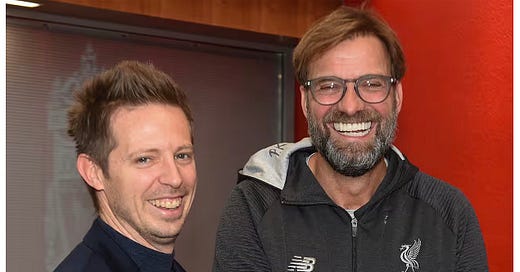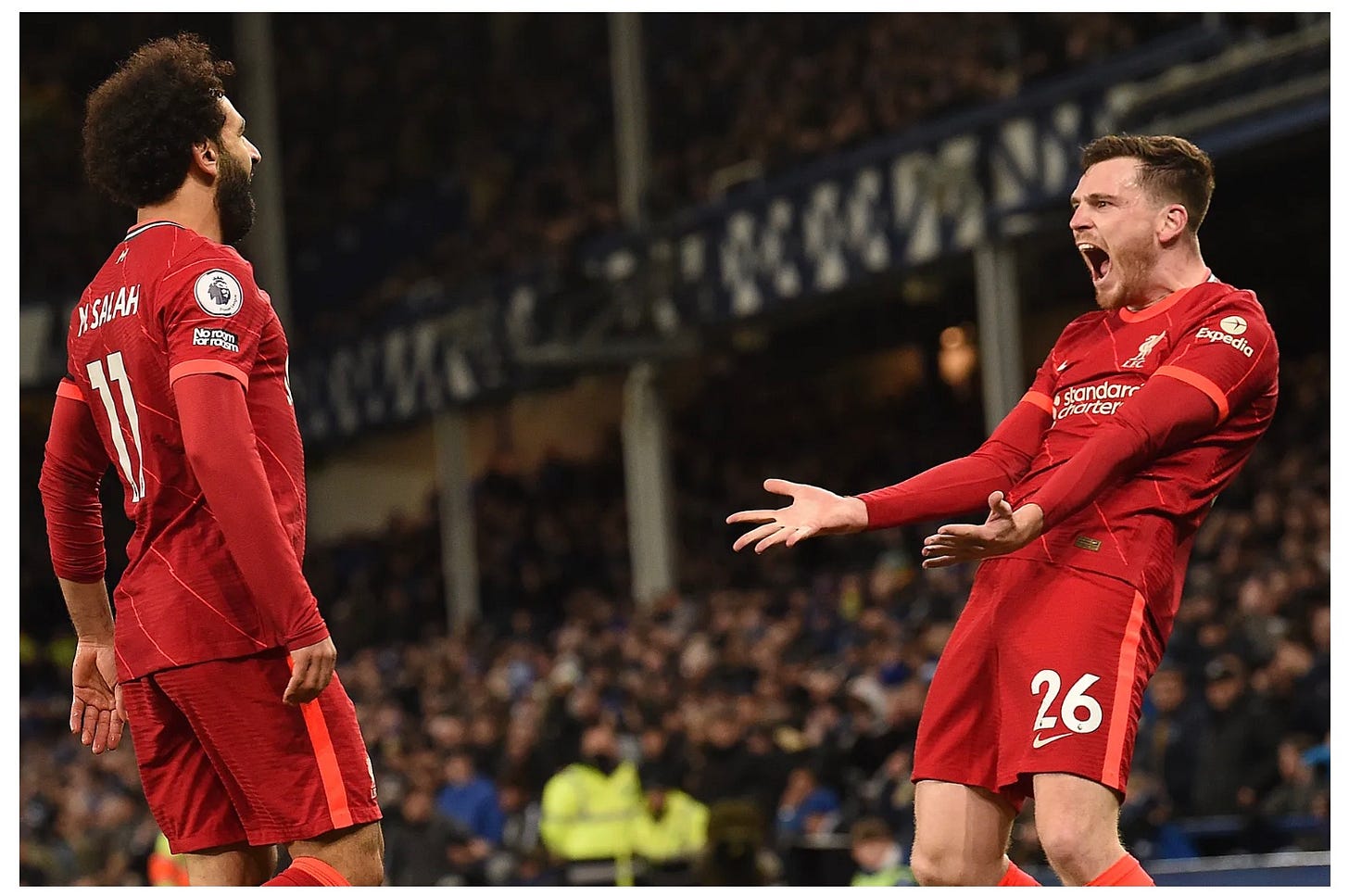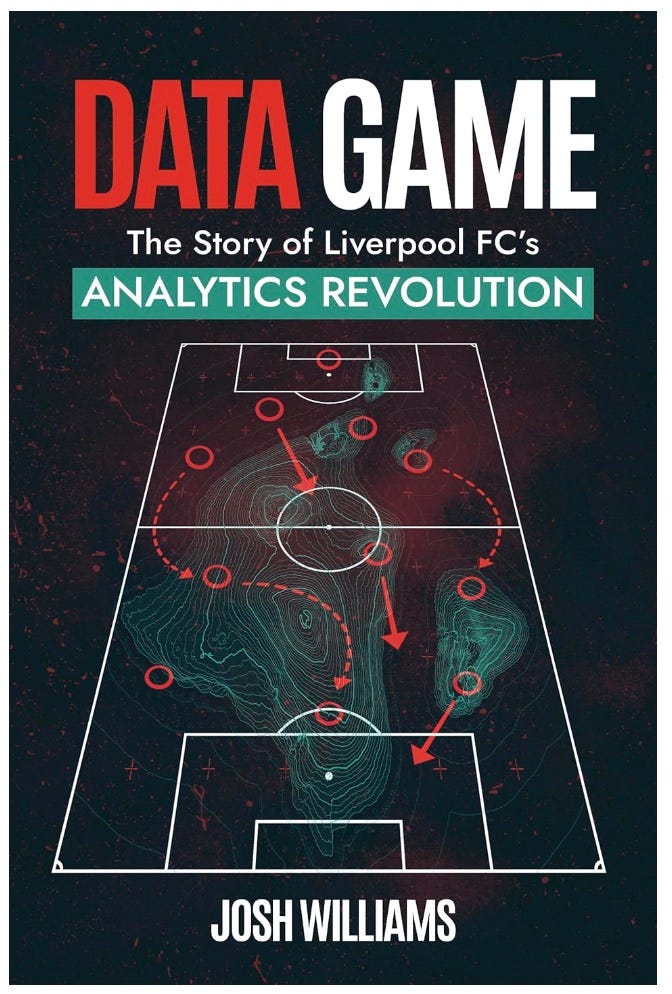Klopp's successor at Liverpool? It's a numbers game
The return of the man behind the data-driven recruitment of Salah, Robertson and Klopp himself will shape the next chapter of the Liverpool story
Jürgen Klopp's farewell tour of English football is in full swing at the moment. Liverpool are still competing on all fronts with just a few months of the campaign remaining, but despite their healthy performances on the pitch this term, the impending loss of their white knight looms.
The German is a divine force on Merseyside. He is worshipped for restoring Liverpool's status as a true European giant, having delivered his club's first Premier League title in 30 years in 2020, with Fenway Sports Group currently in the process of sourcing his successor.
It is perhaps no surprise, then, that FSG are turning to one Michael Edwards as a means of navigating the turbulent period which lies ahead. The former Reds sporting director has agreed to be reappointed in a more senior role, having left the club after a decade of service in 2022. He will officially become FSG's chief executive of football in June.
Edwards is renowned for wanting to avoid the spotlight, so much so that he tends to use fake names when attending football conferences, but his desire to drift under the radar has perhaps impacted the credit that he deserves for contributing to Liverpool's modern resurgence.
Klopp has been the face of FSG's operation since his appointment back in 2015, and since that momentous decision was made, the Reds have prospered on the pitch while consistently flourishing in the transfer market, acquiring gems for reasonable fees before adding to their value.
The Reds boss is naturally credited for changing Liverpool's fortunes almost singlehandedly. Indeed, his presence over the past eight years has only reinforced the embedded belief among supporters on Merseyside that nobody is more important than the manager. From Bill Shankly to Bob Paisley to Gérard Houllier to Rafael Benítez, the man in charge is idolised by the Kop.
Klopp certainly deserves a huge amount of recognition for his undeniable influence on Liverpool, but it was Edwards who effectively appointed him. And when the two-time Bundesliga winner first arrived on English shores, he
found a club that was truly ready to harness the power of data.
FSG initially appointed Damien Comolli to stitch numbers throughout the fabric of the club, after the American consortium had benefited from a installing a similarly scientific approach to decision-making in the world of baseball, delivering the World Series for the Boston Red Sox in 2004, for the first time since 1918.
Comolli was appointed by FSG after being recommended by none other than Billy Beane, General Manager of the Oakland Athletics of Major League Baseball during the Moneyball era. He was regarded as one of the few data-driven operators in football at the time, and he proceeded to appoint Edwards as his head of analysis, having previously worked alongside him at Tottenham Hotspur.
Edwards quickly advocated for the appointment of a scientist named Ian Graham, who proceeded to establish the Premier League's first data science department from scratch.
It took years to perfect the infrastructure and iron out the kinks in the process, with Klopp's predecessor, Brendan Rodgers, largely unwilling to compromise regarding his desire to control Liverpool's moves in the market.
That unwillingness to collaborate fostered conflict behind the scenes, and from the outside, the apparent confusion only fuelled the argument to suggest that a data-driven approach to scouting could never work in football.
Edwards regularly challenged Rodgers, with Liverpool proceeding to sign some players based on the requests of the manager, such as Christian Benteke, Adam Lallana and Joe Allen, and some based on data analysis, such as Roberto Firmino, Daniel Sturridge and Iago Aspas.
Klopp is often painted as the mastermind who unlocked Edwards. He certainly has a special magnetism about him as a foreign Scouser with a gift for turning water into wine, but there has always been more to the story behind Liverpool's resurrection. Football has always loved the concept of an all-seeing genius who is solely responsible for the success of a club, but the reality often tends to differ from that fantasy.
My book, Data Game: The Story of Liverpool FC's Analytics Revolution details the story behind how the Reds used numbers to support Klopp and gain an edge over their wealthier rivals in the Premier League. The Reds got smart and won every available honour in the sport with the exception of the Europa League, which could follow at the end of the current season.
Data even played a part in Klopp's appointment after his Borussia Dortmund outfit struggled for consistency and even flirted with relegation during his final campaign at the helm. After delving into the numbers, Graham concluded that Klopp's men were largely unlucky, despite respectable performances throughout the season.
On the attacking side of the game, Dortmund had failed to convert their chances at a normal rate, and at the opposite end, goalkeeper Roman Weidenfeller had conceded more goals than he should have based on the shots that he faced. Under the hood, though, BVB looked like the second-best team in the division. Klopp was not to blame for their concerns.
“I analysed ten seasons of Bundesliga performances and Dortmund were the second-unluckiest team in that ten-year history,” said Graham.
Data shaped Liverpool's decision to sign Mohamed Salah ahead of Julian Brandt in 2017. The numbers also liked Andy Robertson and Naby Keïta while they were playing for Hull City and RB Leipzig. In fact, recruitment was the primary reason why Graham was initially appointed. “Any analyst not working on recruitment is literally wasting their time,” said Graham, who holds a doctorate in the field of theoretical physics.
Data Game offers an insight into how probability optimised Liverpool's tactical approach, while also providing a glimpse into the future as Artificial Intelligence, holograms, robots and chatbots begin to infiltrate the beautiful game. Liverpool began using numbers rather than human judgment to determine which opposition player had the worst first touch, for example, before setting traps for that player as Klopp launched his signature high press.
The Reds evaluated players based on how many points they would contribute, as opposed to putting too much of an emphasis on physical or technical qualities, when scouting potential targets. In an interview with ESPN, Graham suggested that forwards should be judged based on the shots they managed to acquire and very little else. “He takes loads of good quality shots, there is literally nothing else to say,” he said.
FSG fostered Liverpool's evidence-based culture from the very top upon their takeover in 2010. Smart operators such as Edwards and Graham have been empowered by the American owners, which perhaps explains why the former has agreed to work for them for a second time, having turned down the likes of Chelsea and Manchester United inside the past two years.
The heavyweight clubs on the continent often prove eager to adopt the data-driven badge of honour, but without truly surrendering their ego - their top executives continue to make decisions based on gut instinct and relationships with high-profile agents. The world's best players are useless if they are never on the pitch, and the world's best data scientists are useless if nobody listens to them, which is a common problem in football.
Several well-known pioneers within the space have established their own consultancy companies in recent years, purely as a means of exiting the bubble of football and offering their services to clubs that actually want to listen to their advice. Graham, for example, has founded Ludonautics since departing Anfield, and Edwards was working in tandem with him until FSG used their powers of persuasion to reinstate him.
With Klopp destined to quit English football in the coming months, it seems Liverpool are intent on going back to go forward this summer. The original model that delivered a cutting edge operation will be restored, with Richard Hughes almost certain to take up the vacant sporting director role underneath Edwards.
A new manager, or messiah, will be appointed at the end of the campaign, and while the successful candidate seems unlikely to be as much of a unicorn as Klopp in his field, he now looks certain to be surrounded by the necessary expertise to do his job effectively.
Data Game covers the untold story of Liverpool's analytics revolution, and based on recent happenings on Merseyside, a new chapter could be in the making.
Josh Williams is a football writer, author and content creator who specialises in covering Liverpool. His book, Data Game, is newly available to purchase online and in stores, and he's also recently launched a Substack. You can find him @DistanceCovered on every social media platform, and subscribe to his Substack at distancecovered.substack.com.









I got to know Michael Edwards fairly well after he began emailing me a decade ago, to discuss football. I managed to get a lot of insights along the way.
While he's big on data, he understands the non-data side of things too. Edwards has a very well-rounded approach. I wouldn't want Liverpool to become "robotic" in a slavish adherence to data, but to use it wisely, with common sense.
I think Klopp's ability to get more out of almost all the players, in a way Brendan Rodgers couldn't (or wasn't prepared to try in some cases) shows how important the managerial side of things is, too.
Edwards was also totally understanding about why Klopp would get more say on transfers, as Klopp is world-class, but it did take Liverpool away from the methods that helped Klopp build that first team. But that's football, and it 'sidelined' people like Edwards, then Ward, and Ian Graham.
My view is that Klopp was more important than anyone at LFC, but once he goes, a slightly less brilliant or less charismatic manager can use all the tools to gain advantages, assuming that all other clubs haven't caught up. I imagine the data clubs use in 2024 is absolute huge and complex, but one of Edwards' strengths was making sense of it, and communicating it to others.